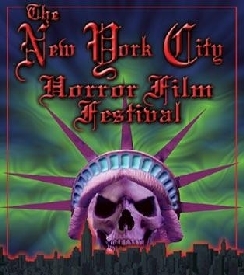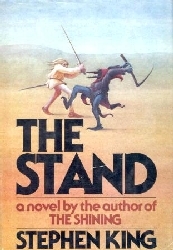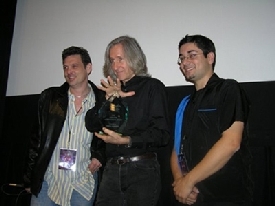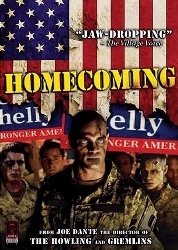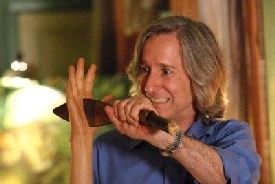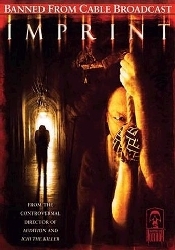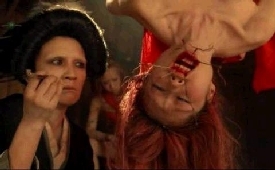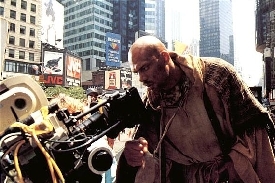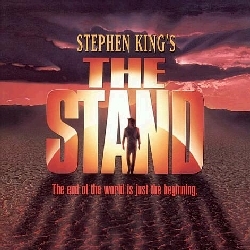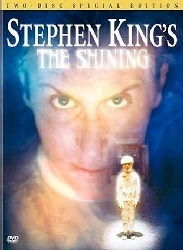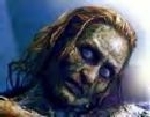|
From HouseofHorrors.com Interviews One of the things I kept wondering about with King's work - you see the film versions, that go to movie theaters - they always change this, they always change that, and its never the book. Its just never the book. And I remember being blown away by the ending of that book, when King talks about the hand of God just coming down and grabbing the nuclear weapon - destroying Vegas and most of your heroes by the end of it, but - how are you gonna shoot that thing? I remember just sittin there, bein all pumped - and Im not in a movie theater, Im in my house watching it on television - and Im pumped like at a movie! And the casting - by the way, not to blow a whole lot of sunshine up his butt - but Im a big fan of that. Then to go in, and - its not a remake of the Stanley Kubrick film... Because while The Shining - Kubrick's version - is probably one of the greatest haunted house films ever made - its a great film - its not the book. Its not even close to the book. Youve got Jack Torrence - youve got a couple of the you know, youve got the Overlook Hotel and youve got all those things - but theres no maze in that book. He doesnt freeze to death in that book. Its like theres just touches in there. So when I heard that the same guy who did The Stand was going to remake - and actually make a faithful adaptation of this thing - another thing: how are you gonna do that ending? Because as I understand it, Kubrick just didnt see it. Couldnt do it. Couldnt get it done. Mick Garris could. And I loved that version. Another thing is [Steven] Weber - casting Weber in that role - like, that poor bastard... Having to follow Nicholson? And you guys wind up pulling the thing off? Jees - my hats off to you. So - just by those two things alone - right there worth the price of admission, right? Im gonna let you tell the stories - where is that Lifetime Achievement Award... Cmon down. Ladies and gentlemen - Mr. Mick Garris... (long applauds) Mick Garris: I got a chainsaw Sunday but they didnt give it to me. Well - nobody is supposed to know until tomorrow night [October 22] when the Chainsaw Awards are broadcast. Mike Gingold knows because its the Fangoria Chainsaw Award. But we won for the best television presentation - the Killer TV award - so... We've been winning a lot of awards because we have a great group of filmmakers who decided it would be a lot more fun to do something the way they want to do it, than to get paid lots of money. This is an incredible honor and I so appreciate it - and thank God for social outcasts like us. (applauds) Im so glad I was not popular and on the football team - that would be a shitty life - instead of winning this great Lifetime Achievment Award from you guys. I really, really appreciate it so much - because Im first and foremost a film fan. A fiction fan. And a genre fan, you know? The first movie I remember seeing was Son of Kong when I was about three years old - on television - near Los Angeles - in San Diego where I grew up. There were all these late night horror shows back in the days - those of us with gray hair can remember. And you know - it really was all the social outcasts - the popular people hated that shit. Thank God, you know? Its just a real great honor and Im so pleased to be here in New York, where the fans are really fans. They really care and really give a shit. To be able to - I feel like - you know Zelig that Woody Allen movie? You know to be surrounded by all these fantastically talented people - all my favorite filmmakers in my growing up, my gestation period, my wonder years. You know, here I am working side by side with John Carpenter and John Landis and Tobe Hooper and Stuart Gordon and all these people and it just - its like a great dream. The fact that the fans have embraced the show and thats its worked well with people who care is so great, because if it had been a failure, we did it. But now that its a success around the world it just amazes me. Because Im involved with it, and that doesnt usually happen. So - these guys have been so great. I mean when you can get John Carpenter to come back a second year - I mean, he doesn't ever have to work - and he doesnt like to work that much. He had such a good time on the first one that when he came back for the second one... First of all, theres no smoking on film sets. John Carpenter can not help but smoke. So we actually built him a smoking lounge just for him to be able to relax and have a cigarette. Its so much fun to be able to go into the studio each day and watch all these different people working in totally different ways, and encouraging everybody to do exactly what they want to do, the way they want to do it, just dont spend too much money. And to encourage them all to be as different as possible. We dont want to be like Tales From The Crypt where you knew what you were going to get every week. You know - its a great show, but thats not what we were trying to do. We want it to be a totally new experience every week. One week its a John Carpenter film, you want it to act like a John Carpenter film - a Tobe Hooper film - a John Landis film, and then you know youre going to get humor with your horror. Joe Dante doing Homecoming, showing that he could do political satire in the guise of a horror film. Its amazing. We won three awards recently, two of them for Homecoming. We won the Chainsaw Award last week. We won an Emmy, believe it or not. Film Festivals - a Saturn award. Its like, "For us?" You know? Its great. So I just thank you so much for being a part of this and inviting me here to join you. And to show you this before Showtime's even seen it. So - you are the absolute first audience to have seen Valerie on the Stairs - it was just finished two days ago. It was great - when I was invited here, I was like, "We've got to finish this!" so we could view it here. And the day before I left, I had to run down to Starz Entertainment and show it to the head of the company so that he would approve it - cause Id already said yes to Michael but I didnt tell Starz... So I hope you enjoyed it. Its a very different kind of show, or angle for the series. I hope it wasnt too slow, but, its sort of a quiet sort of thing that creeps up. And Tony Todd - who is an icon in the genre (applauds) - delivers a performance thats practically Shakespearean. I really think it was wonderful - so Tony I thank you so much for joining the party and making it a special experience for everyone involved, especially me. So, thank you. And everyone here - thank you so much. If there are any questions I can answer Id be glad to... Q: One of the things I love about the Masters of Horror series is the variety of talent you get each week. For instance, seeing Tony Todd in one of your films - and how you used Richard Band to do the score... Mick Garris: Richard Band is normally Stuart Gordon's composer. And oddly enough - and by the way, Stuart Gordon just finished doing The Black Cat, with Jeffery Combs as Edgar Allen Poe - its great. And Stuart just did the movie Edmond - which came out recently, I dont know if it played here in New York - and that composer was not Richard Band - he used another composer [Bobby Johnston] - and my normal composer Nicholas Pike was not available because he got a feature last minute, so I grabbed Richard Band and said, "Please - would you do this?" He was nominated for an Emmy for his score for Dreams in the Witch House last year - and I love the music that he did. But yeah - we really want to work with people who know and love the genre - and every time we've experimented with those who dont, we more often than not have thrown out the scores. Its really depressing, and a lot of directors want to bring in their own - we encourage the directors to do it their way - sometimes they wanna bring in somebody, or theres been a lot of aggression by say somebody from a popular rock band, who loves horror and knows how to score... its tough - it really does take a lot more than just being a fan to be able to do it. It takes a lot of experience, especially in composing music. But yeah - theres a long answer to your comment. Thank you. Mick Garris: Yes - well, actually this year for season two we had some - uh, an assortment of directors that we didnt have last year. Including Peter Medak and Tom Holland and Ernest Dickerson and a whole bunch of different folkes. Next year - if there is a season three - and thats not in stone yet - we hope there will be. Were acting like there will be. There are a lot of people - because of the way the show is made, it is a television series, although we hate to refer to it that way, it is a series of short feature films - but theyre done ten days each back to back. So to schedule all 13 directors that way is virtually impossible. So we hope that next season, if there is one that we will get people that have already said they will do it. People like Rob Zombie, Guillermo del Toro, Ken Russell wants to do one, he has a story all written and rarin to go. But uh - its a matter of timing and scheduling and all. Q: How about Tom Savini? Mick Garris: Tom Savini is a great idea - he thinks so as well! (audience laughs) So... We're just trying to make the right thing work out... Ive seen Toms films. He does great work. Q: Can I get Valerie's phone number? (audience laughs) Q: What other directors are on for this season [two]?: Mick Garris: What other directors are on for this season - ok lemme see I have to count to 13... uh in Tokyo were shooting another Japanese episode with Norio Tsuruta, who did Ring Zero, Premonition, and a couple of other Japanese films. We have Carpenter back, Hooper back, Landis back, Stuart Gordon, Joe Dante, Ernest Dickerson, Tom Holland - and oh Brad Anderson did a fantastic one, it really great. He s a New York based director who did The Machinist and Session 9 - two of my favorite recent genre films. Really smart, smart stuff. The film he did for us - I think its a masterpiece - its really great. So - I dont know how many people I counted - who did I leave out Cynthia? [his wife] Cynthia Garris: Peter Medak. Mick Garris: Peter Medak - whose The Changeling I think is one of the better ghost films of all time. Theres others - Mike [Hein] you probably know better than me... Michael Hein: Rob Schmidt. Mick Garris: Rob Schmidt, who did Wrong Turn. He's our Lucky McKee this year - the one who, you know, the name people would be familiar with - schedule was a problem and we had some - Im mean, we wanted to make sure that every "master of horror" would be somebody who had done something influential and successful, and we thought, well, Wrong Turn was a really well made movie and he's a really good guy who really knows his stuff. Q: Whenever you hear the term "Masters of Horror", the name George Romero immedately comes to mind. Whats the obstacle, maybe, with him? Mick Garris: Uh, George has had a lot of scheduling difficulties - theres kind of been a lot of things going on - professionally and otherwise in his life - he has committed both years to doing one - and um, he was going to do Haeckel's Tale for a while, and ended up not being able to. His Land of the Dead schedule took him all over the world, to do promotion and stuff. So we couldnt get him on season one. On season two - it just became impossible as well. So we are hoping he will be among the season three people. He is committed to doing one, but we just havent been able to make it work with the time yet. But were all huge Romero fans - and he of all people should be among Masters of Horror. But I should also say - "Masters of Horror" the name, was a joke. At one of our dinners we had, where a bunch of the genre directors got together to just shoot the shit. The very first one we had - it was Guillermo del Toro, and Tobe Hooper, and John Carpenter, and Larry Cohen - Larry Cohen also did one in the first season. There were a dozen of us there. And someone was having a birthday party at the table next to us. And so, we all sang Happy Birthday to You - and Guillermo del Toro stands up and says, "The masters of horror wish you a happy birthday!" So - thats where the name came from. It was intended as a joke. Then it turned out to be the only way we could sell the show. Q: Its a great title... Mick Garris: Well - it is what it is. I mean, what else can you call a show with John Caprenter and Tobe Hooper and all these people... yeah. Q: How - does each director choose the source material, or do you have a sit down with an idea already on the table... Mick Garris: Its about half and half - the question being how does a director choose his material. About half of them come in with material - what they want to do - Stuart Gordon, Joe Dante, uh John Landis in the first season and then we hooked him up with a writer in the second one. And about half of them are things that we develop independently. We'll bring in writers that I know who are really well versed in the genre. Richard Christian Matheson, Drew McWeeny, Scott Swan, people like that. Or we will have short stories - short fiction that we want to adapt. Or the directors will bring in material. So, its about 50-50. Q: With Masters of Horror, there really arent any female directors. Mick Garris: This always comes up. (audience laughs) No - this always comes up. We've tried. We went to Kathryn Bigelow, we went to Mary Harron - we went to everyone that - and again it has to be someone who has made influential horror films and not somebody who is in that realm unknown. Most of the ones we went to turned us down. Mary Harron doesnt want to think of herself as a horror director, apparently. American Psycho is one of the great horror films of the last ten years. Kathryn Bigelow had some health issues and the like. Were still trying. We would love to do that. Were trying to mix it up as much as possible. We dont want it to be all a bunch of gray haired white guys. Q: Whats the story behind the "13" episodes? Mick Garris: You know - 13 episodes is a standard order for a show. In network tv - usually theyll order a back 9 - for a total of 22. But 13 is as much as we can handle. Id love for there to be a significance to it - like "13" "horror" wink wink - but its just a standard number for an industry order on a series. Q: Can you talk a bit about the controversy behind season one's Imprint by Takashi Miike? Q: Give us a hint. Mick Garris: Have you seen it? Q: Yes. Give us a hint. What was the problem? Q: Can you talk a little bit about Chirstopher Lloyd, since he hardly shows up in front of the camera anymore? Mick Garris: Well - Christopher Lloyd and I did a movie together some years back for television called Quicksilver Highway. He's a really wonderful guy. He's nothing at all like what you see on camera. He's very shy. He never curses. He's very quiet - theres no "Hey! Hey!" Its all very subdued. I think he works as much as he wants to. He really liked - there were some really chewy speeches in Quicksilver Highway. And - he responds to the writing. And theres some stuff in this where he really responds - I think he's great in this. What I love is that he doesnt do Doc Brown. There are moments when you get that gruff Lloyd outbreak - but most of the time he's very straightfoward and we dont really get to see him that way. I was very pleased with his performance. I dont know how much he works, but I think he's done a lot of television that we've not been exposed to as genre fanatics. Anything else? Its cold in here, huh? (laughs) Q: Of all the directors that youve sought after to do Masters of Horror - which one or ones have been the most difficult to get behind the camera? Mick Garris: Romero's been the most elusive. You know - its hard to reach him. He moved out of Pittsburgh and was living in Toronto. I dont know where he is now but its very hard to reach him. But Clive also told me that, if we were picked up for a third season, that he'd direct one. Thats would be great because its been a long time since he's directed. He had a really bad experience with Hollywood - and he's kind of bitter about them. But this is so non-Hollywood - you know - we shoot em in Vancouver. Showtime only licenses it - they dont produce it - so they keep their mits off. There's no studio. We do this entirely through the auspices of Anchor Bay - and their financing. Q: Whats the chance of this maybe ending up on Starz since... Mick Garris: Yeah Starz and IDT have merged. So - no - Starz doesnt have the budget to produce this as a channel. But it might be the secondary place it runs, after it runs Showtime, it might go to Starz. Spike is interested but theyd have to cut them to ribbons, and, you know... we cant really control what happens after that first run. So - if it goes into syndication. Q: I can only imagine the workload, doing Masters of Horror, not only producing 13 episodes a season, but also doing you own. But past this series - what do you have brewing? Perhaps something that you wrote? Mick Garris: There's a lot of stuff in the warehouse. Yeah - Id love to take the novel [Development Hell], and either do it as a feature or as a series of like 9 one-hour chapters, with some of the "Masters" directing some of them as well. And King and I are talking about another couple of projects. Masters Season 3, if that happens, thats gonna make a big difference. There's a bunch of things in the work - in fact my agent's assistant is here, in the back - she can tell you more than I can. Q: You mentioned Vancouver - I notice that a lot of filmmakers like to shoot their material there - even going to back to the television series Millenium, as I remember. What is the attraction of that city in particular? Q: How much? Mick Garris: How much over? Well... should I tell? (crowd encourages him to do so) Ok. It went over by - this is embarrasing - five thousand dollars. (audience mocks sympathy - awww) Including the bond! Which was.. you know... much more than that. Its a point of pride to do your best work and to do it responsibly. Q: How do you do that on something like The Stand... Mick Garris: Well - The Stand was well scheduled and well budgeted. The Stand was 28 million dollars. But it was for eight hours - it was for four movies. 100 days shooting. 5 months - 5 states, including here. We had barely enough to do it - it was a nightmare shoot, because we're outside trying to shoot a dead world where there cant be any planes or trains or automobiles. It was very difficult. We shot most of it in Utah which is not the most happenin' state. Unless youre Mormon. Which, coincidentally, Im not. Q: What was it like shooting The Shining - was there any anxiety about doing it after the Kubrick film? Q: You did a great job... Q: Are you on the filmmakers panel on Sunday? Mick Garris: Im not on the panel on Sunday. Q: Dammit. Mick Garris: Im going home tomorrorw. Michael Hein: A long deserved trip home for these two. He's been all over the world nonstop, and we're very very thankful that he came to New York. (long appaluds) Mick Garris: I loved spending Saturday night with all of you. Thank you so much. House of Horrors wishes to thank personally Mick and his charming wife Cynthia for attending the NYCHFF and gracing us all with a personal and unedited discussion on his film career - which really won me over as a new fan. Mick Garris is obviously a fan of the genre first and foremost - and his enthusiasm for that which we all hold dear to our hearts is infectious. Valerie on the Stairs was the type of story that appealed to the writer within me - and his production of Masters of Horror as a whole really brings out what we, as fans, truly look to and love about horror films - original, unedited ideas, unformed and untrimmed by major studios. He has brought us all the gift of being able to see new material from all of our favorite directors - from the rare modern works of John Carpenter to the revamped aggression of Tobe Hooper - Stuart Gordon - it goes on and on. All the way to the banned-from-television Imprint. Masters of Horror and Mick Garris reflects that facet of horror that we long for - unedited directorial visions that supercede ratings and popularity. This is what makes Mick Garris stand out as a director, most especially as an adaptator of Stephen King - and as a producer, delivering to us the best horror movies available today on a weekly basis. Thanks to festival directors Michael Hein and Anthony Pepe for making it happen, and to anyone who was in the area and missed it - come down next year and join the celebration. Its like being invited to a private screening party by the director himself. A very personal and special experience for anyone who buys a ticket. House of Horrors will be back with Mick Garris to talk a bit more about his recent book Development Hell - and will keep you updated with weekly Masters of Horror reviews as they come out - so keep it here, and see you at next year's New York City Horror Film Festival.
© Copyright by HouseofHorrors.com |
